Say hello to Saul, my overachiever
Personality types and how they contribute to chronic fatiguing illnesses
A few quick announcements before we dive in this week:
📢 The Tonic hit 400 subscribers yesterday! 📢
All in under four months! I was blown away 🤯. My goal was to hit 500 subs by the one-year mark (next July), so this is really exciting. Thank you all for reading, subscribing, and helping me get there!
📦 Support for The Tonic 📦
If you’ve been here with me here for a bit, you know I’ve said I can’t turn on paid subscriptions (yet? ever?) due to my disability benefits: either because my benefits would get reduced, or because having to pay taxes on the income would alert disability to the existence of my newsletter, which they could then use to argue that I have the ability to be gainfully employed (I do not, yet - and I have the test results to prove this).
Each post here takes me many days before I can hit publish; I can only sustain about 30 minutes of brain work at a time before my energy starts to tank and I need ‘flat’ rest (laying down), which helps restore oxygen to my brain (an issue with long COVID and ME/CFS sufferers):
Several of you beauties have wanted to become paid subscribers and have reached out to ask me how you can do so. Several of you have also made pledges to support my writing (which would convert to paid subscription once I turn that feature on), which has been such a generous show of confidence in what I’m peddling here.
For anyone who wants to and can, I am now offering an easy way to support my efforts here: by helping me get personal care, pet care, household, or food items I use regularly (or a book I’ve been wanting to read). Starting with last week’s post, here is what you’ll see at the very bottom of my emails:
The Tonic is free to read - Amy is so happy you’re here! There is no subscription option here like with other Substack newsletters. However, if you are valuing the experience and are able, please consider a show of support by sending a gift of health, wellness, or joy from this Amazon wish list. Anyone who does gets a 📢 in an upcoming post. Thank you!
There is no pressure to do so; everything here remains free to read (I am loving the engagement - keep it coming!). You may however occasionally see me include this wish list link a bit higher than the end of my email, as I know some folx can’t make it all the way to the end (and that’s okay).
Thank you again for being here. Now for this week’s post.
I’m not a human being, I’m a human doing.
—Dennis Quaid
I read this quote recently in People magazine (don’t hate) and it hit me differently than it would have in the “before times,” when I would have likely nodded in agreement and thought, “Same, Dennis. Same.”
When you enter the world of myalgic encephalomyelitis/chronic fatigue syndrome (ME/CFS), you start learning all about the illness - including the hallmark symptoms of pervasive lack of energy, unrefreshing sleep, and post-exertional malaise (PEM). In lay terms, PEM basically means paying for today’s energy over-expenditure tomorrow or the next day or for days/weeks/months/and sometimes even years after.
You also learn that certain personality types are more prone to developing the illness; specifically, high-strung, type A, overachiever types or perpetual helpers or people pleasers. The thinking is that you’ve either been too busy accomplishing shit and/or too busy helping or responding to others’ needs, and this results in not enough attention paid to your well-being. Or it results in missing the warning signs - giant, flashing in neon, or subtle but growing larger or louder over time.
For me, it was the former: for years before the pandemic, I received big, frequent, billboard-sized warnings with arrows and underlining and little cartoon characters jumping up and down trying to get my attention. But I swatted them away and kept plowing through life. More on this later.
The achievement addiction
I have a little of both going on, the overachieving and people pleasing tendencies, though I am definitely predominately the overachiever type. I feel like my people pleasing has always been in the service of what I can accomplish, i.e. making people happy by being good at stuff or getting tasks done. So, if checking a box made others happy, and that made me happy, then it was really the accomplishing of things that was at the root of it all.
I have analyzed these tendencies up the wazoo in therapy with every therapist I’ve had (probably 7-8 over my adult life), and their origins will be no surprise: they come from early in my childhood and were cemented in place through my teens, 20s, 30s, right up to when I got COVID at age 44 and even through today.
I am the youngest of my parents’ five children, all of us born in the 1960s or 70s, and all of us struggling to find our footing in a family of seven with parents who were either clinically depressed or otherwise not very present. One of our brothers suffered a traumatic brain injury (TBI) when he was a boy; the rest of us did not have a “big T” trauma per se, but there was a boatload of neglect. No rules, no curfews, little to no instilling of good or healthy habits. We have a lot of crazy stories about our upbringing, and mostly we find ways to laugh about this as adults, but any of us could have easily gone missing, joined a cult, or succumbed to addiction, and it would not have been all that surprising.
I recently finished three years of intense dental work, all stemming from spending the first 18 or so years of my life eating total crap (provided mindlessly by my parents) and not brushing my teeth much (no one made me). Most of my metal fillings were 35 or more years old and so humongous, it’s a miracle my dentist was able to save each tooth. When I left his office a few weeks ago, after finishing the last of my eight crown/root canal combos, I told him I felt like we should be celebrating the end of my childhood dental trauma.
“Maybe we should have had a cake?
Oh wait…that’s what got me in this mess to begin with.”
Each of my siblings and I found our own ways to cope with the chaos that was our family life.
My way of making sense of life getting attention was by accomplishing things - first through excelling in school and then at sports. This was never a conscious decision on my part, as far as I remember. What six-year-old has that much presence of mind? But by that age, my three oldest siblings were teenagers or young adults. There was alcohol, drugs, parties, accidents, and lots of yelling by my parents ➡️ my siblings. It was a busy, noisy, messy, and at times dangerous, existence.
My brother just four years older than me was at as much of a loss for attention (and affection) as I was, and he got noticed by acting up. I must have figured out at some point that this was only getting him negative attention and I’d have to try something different in order to break away from the pack. Or maybe it went like this: I was good at school, or I showed some kind of promise that my teachers alerted my parents to. This got me the kind of attention my siblings weren’t getting, so I figured out how to keep it going.
It doesn’t really matter how it happened. All I knew is that I was getting praise while the rest of them were getting my parents’ scorn, judgement, and/or indifference. And that just turned me into a one-girl operant conditioning subject.
Achievement begot praise and praise released all the feel-good chemicals. The praise never lasted all that long, so I had to keep feeding the beast to keep it going. And round and round I went.
Wow, this is sounding a lot like addiction after all.
I remember studying for an elementary school spelling quiz in my living room while my brothers and their friends drank beers and smoked the weed that they harvested from our own backyard. They were being loud and obnoxious, but that was the normal din of our household. I used studying to go into a hyper-focused nerd-fugue so I didn’t have to think about the needs I (we) had that weren’t getting met. Not that I realized this at the time, but I can see this now as an adult. School became easier for me than life at home, so I basically brought school home whenever I could.
By fourth grade, I had been placed in the obnoxious-as-it-sounds Gifted and Talented program (G & T), which I was in through twelve grade. In sixth grade, I won the spelling bee for my elementary school. In seventh and eighth grades, I won for my middle school. After each win, I went to regionals, and after coming up short in sixth and seventh grades, I finally conquered it in eighth grade and made my way to the Long Island finals of the national bee, where I finished 9th out of 35.
Check out this geek brigade.
Regarding athletics, I’ll summarize: I was good at a bunch of different sports through middle school and high school, eventually landing on volleyball as the one I was best at. I played Division III college ball and then played competitively on local and regional teams from the time I graduated college up until a month before I got infected in March 2020, after which it was game over. A forced retirement, which stung hard since I was still playing at a medium-high level.
In high school, I continued obsessing over schoolwork. My thought patterns would go something like this:
“If I don’t do well on this quiz, it’ll affect my grade for the quarter, which will affect my grades for the year, which will impact my ability to get into a good college and impact the outcome of my life and career.”
Every 15-point quiz took on the weight of my entire LIFE. It was pretty intense.
I lightened up a bit in college, mostly because I went to an “elite” private school where most of the kids had a leg up on me as far as resources, upbringing, and what I thought of at the time as natural intelligence (I now know that part to be utter bullshit, but oh, the stories we tell ourselves).
Graduation, first job, promotion within four months, graduate school, getting my professional seminar paper (like a thesis) published in a clinical social work journal at the urging of one of my professors. More jobs, more obsessive and hard work, more attention, more success.
Lots of privilege along the way, admittedly. For example, at the interview for my first big job after grad school, the interviewer told me she almost didn’t call me, except she saw the name of the aforementioned college I attended and that impressed her and made her give me a chance. Things like that. The attention I got definitely wasn’t all from hard work alone, but none of this occurred to me. All that happened was the same formula that worked as a kid:
And then I got sick
By this point in our story, I have an executive-level job and a boss who I returned to after leaving for five years to work elsewhere because no one in the interim valued me (i.e. heaped praise, appreciation, and attention on me) like she did.
After I got sick and stayed sick, the profound fatigue, neuropathy, shortness of breath, brain fog, and a host of other symptoms should have affected my ability or drive to achieve. They did not, and I don’t say that with pride. I may have taken more breaks, but in essence, I worked just as hard, wrote just as many grant proposals, managed all the contracts, started up several new programs, managed and lead teams of smart people and high performers.
In other words, I kept trying to make my lifelong, overachieving patterns work while my body was sending me the most critical alarm bells it had ever rung. It’s as if all up until age 44, I was able to hammer a square peg into mostly square holes (but sometimes these were more like square-ish rectangular holes, and I’d keep hammering and eventually force the dimensions to work). After COVID, it’s like I was trying to hammer these same square pegs into round holes. I did some great work during these years, in spite of it all, but my body was what paid the price, not my career.
In comes Jamie, therapist extraordinaire
As you may recall reading in my earlier post Is Your Underwear Clean? (If so, everything else can wait), somewhere on the sickness/work journey, I found Jamie, a therapist from Canada who herself had ME/CFS and had paced her way to substantial recovery. It was Jamie who started gently interrogating the parts of me that were both adaptive and maladaptive, in life and in respect to the illness. We pretty quickly homed in on my “achiever” part.
Incidentally, I also began doing the Gupta program, one of the brain retraining programs available for people with ME/CFS, fibromyalgia, long COVID, etc. Ashok Gupta, the founder who also recovered from ME/CFS and went on to develop the program, talked a lot in his videos about these various “parts” - the achiever, the helper, the people pleaser, etc.
Jamie encouraged me to name the achiever part so that we had a way to both humanize and reference it. The name Saul came to me out of thin air. When I try to analyze where I got that name from, I think it goes something like this:
My achiever part feels inherently masculine (because: patriarchy? capitalism?), but it can’t be the name of anyone I know because I’ll just associate it with that person and POOF. Saul was named.
Parts can be wonderful things - they make you who you are and may have brought you a lot of success in life. They are inherently trying to protect you, to gain you the love and acceptance you need(ed) in life. But they can also contribute to you getting sick or staying sick, because you do not or did not see or take heed of the warning signs and REST. You routinely push(ed) past your limits.
This is where I have spent the past few years. At first, I did this while still working a big job, but I could not kid myself; working even part-time was making me sicker. I had no shot at recovery while my nervous system was continuously amped up by the stress I was carrying.
But even after I left work, I was still doing too much. I was approaching recovery with the same set of overachieving tendencies that I had relied on all my life: running to every doctor I could think of, getting every test done, pushing and pushing for my disability benefits until I was approved, writing a blog piece about that, doing media interviews. While all this was going on, I was still doing too much around the house; quotidian tasks that made my POTS symptoms (high heartrate/dizziness) and my fatigue worse. I did not feel that it was acceptable - that I would be loved and accepted - if I wasn’t accomplishing something during the day. Deep down, I felt unworthy of the kind of true, deep rest that my body would require to have a fighting chance of healing itself.
Even though the messages about pacing, as I’ve discussed here and here (the section on the Visible Plus app), have slowly moved from an intellectual understanding to a deeper integration into my consciousness and actions, I still at times find myself approaching my recovery with too much intensity.
Exhibit A: my weekly recovery chart, which legit helps me remember all the things during the day that help me feel better.
I used to add up the number of things I did in a day to help my recovery, until I realized that there was no point to doing that and it was just Saul taking over again.
Being more aware of Saul’s tendencies to fast-track my recovery then causes me to tape things like this next to my recovery chart (from the book Decode Your Fatigue by Alex Howard):
My new therapist knows all about Saul too and she also points out when he might be cropping up in maladaptive ways, which I’m still not always aware of. In my session this week in fact, we talked all about how Saul is what keeps me reading all of these intense non-fiction books, mostly science-based lately, in an effort to both feel smart still and to try as hard as I can to ‘achieve’ recovery someday.
Heck, even this Substack slips in and out of being driven by Saul, as I’ve discussed in therapy several times now. I do too much; I pull back. But ultimately, I’m still motivated by the likes and comments and restacks and number of subscribers (see: beginning of today’s post 🤦🏻♀️). Appreciation begets approval begets worthiness/love.
(Here’s a win from therapy this week: at my therapist’s suggestion, I turned off the notification emails that tell me whenever someone likes a post of mine. She told me to only view that information with intention by opening the app or the site, not as an instant gratification mechanism that in any way that tallies up my self-worth).
As Ashok Gupta says, these parts are stuck at the same developmental level as when they were created, so we need to think of them as the part of us that is child-like and needs to be nurtured. And we don’t need to get rid of these parts of ourselves; just lovingly “re-train” them with messages about our worthiness:
I’m good enough/lovable just the way I am
I deserve love even if I’m not accomplishing things
There is nothing I have to prove in order to have the right to deeply rest
If your ‘part’ is a helper or people pleaser, you might re-train with these kinds of messages:
I am still worthy of love when I put my own needs ahead of others’
We don’t need to get other people to like us to be respected and loved
These parts will get in the way of our pacing, stress management, nervous system regulation, and ultimately, the ability to put our bodies in a state of deep rest that is a must for having a shot at healing.
Oh, and the big billboard I missed before I got sick sick?
EIGHT YEARS of excruciating migraines, 20-25 days every month. I barely took a sick day. After several years of chasing down doctors and remedies, I finally put these into remission with a combination of dietary changes, monthly preventative injections, and getting an IUD. Reducing stress and getting more rest were not part of my recovery plan. I believe that my inability to learn that lesson put me right at long COVID’s doorstep.
But now I know better. And that is the best I can do.
Does anything in this week’s post resonate with you?
What ‘part’ are you always working to keep in balance? In addition to the overachiever, there’s the helper, the people pleaser, the safety seeker, and the inner critic.
Any hacks for balancing out your tendencies or pacing?
Join me in the comments with your thoughts 👇🏽
Now stick around for…
🥳 The After-party 🥳
Announcements, links to articles and studies, recommendations and shout-outs, and miscellany joy and/or tomfoolery.
🦠 Fourteen percent (14%) of Americans reported having had long COVID symptoms at some point in time, according to data analyzed here. “It is much higher among women than it is among men; it varies by ethnicity, being highest among whites; and it is hump-shaped in age, mimicking the age profile of negative affect which is highest in middle age.”
🗣️ Last Saturday, Ed Yong was the keynote presenter at MassME’s annual meeting - watch the replay here. Ed is the revered science writer who seemingly single-handedly shone the light on long COVID and ME/CFS over the past three years with his in-depth articles for The Atlantic. Ed is the reason I figured out what was wrong with me back in June 2020 and proceeded to find this community. His talk was great; check it out.
🗞️ Here are a few relevant posts I enjoyed this week, particularly for overachieving types. The first one: oof. The second one: funny cuz it’s true.
🔦 Excellent article: How long COVID is shining a new light on chronic fatigue syndrome. A decades-overdue light, but better late than never, I suppose.
😷 Masks work. Read more here.
🔬 UK residents: *New study aimed at increasing understanding of the response to exercise in people with Long COVID.* If you would like to participate in this project, please contact Nik Kudiersky – n.kudiersky@shu.ac.uk
🎶 I was curious about this today, so I took to Google and here it is: Sad Girl Playlists Aren’t Just Trendy—Study Finds Sad Music Can Boost Your Mental Health. Seems Sir Elton was correct:
If someone else is suffering enough
Oh, to write it down
When every single word makes sense
Then it's easier to have those songs around
🤦🏽♂️ Loser of the week: guy from L.A. who asked for his gluten-free bagel to be scooped out. Know your audience, dude. NYC bagel shops don’t fuck around.
🏆 Winners of the week: LONG HAULERS! The Long COVID Reader is now available to read on Kindle, with paperbacks coming soon. You can get it on Amazon or Google books. Check out my essay in the book - just one of 45 diverse long hauler voices contained therein.
🐈⬛ 💩 And finally, it’s this week’s Cat Dump. Yoga FAIL edition.
I thought it might be a good idea to put my yoga mat out early one day and leave it there; maybe seeing it would entice me to lay down and do some grounding/deep breathing? Well, the shorthairs had other plans. I guess humans aren’t the only beasts who crave novelty.
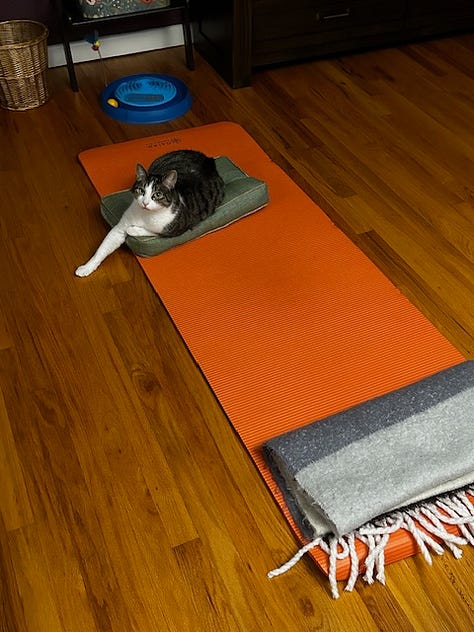
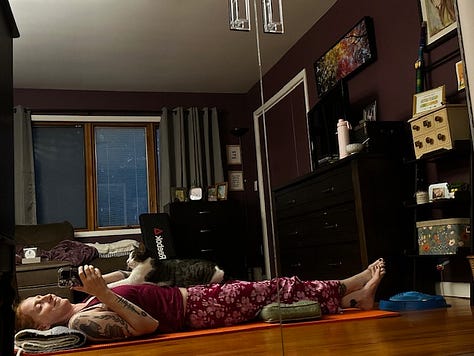
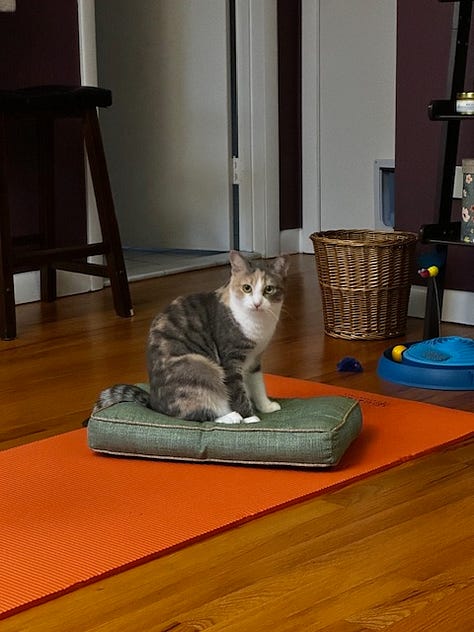
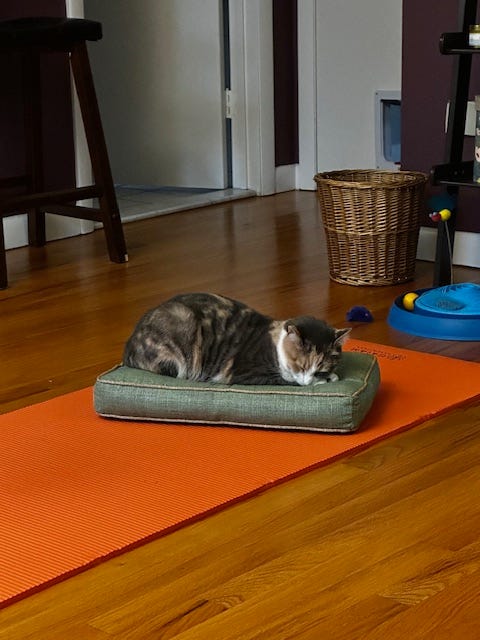
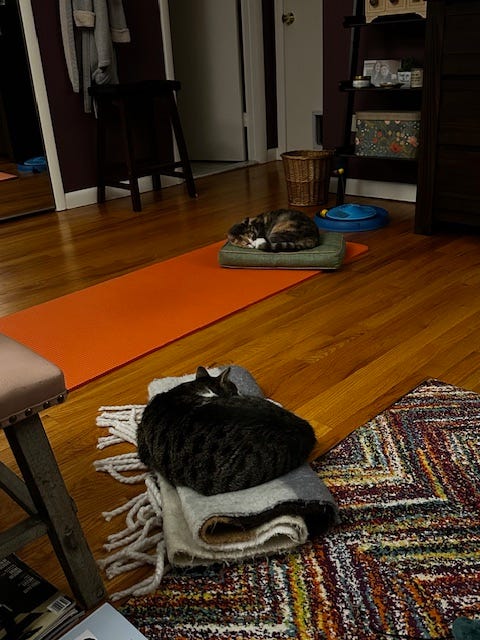


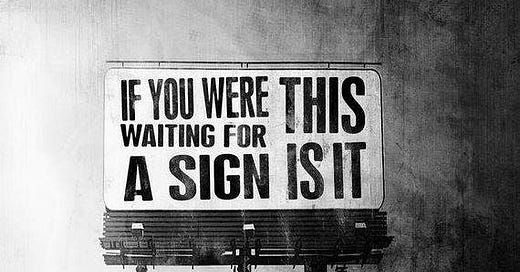


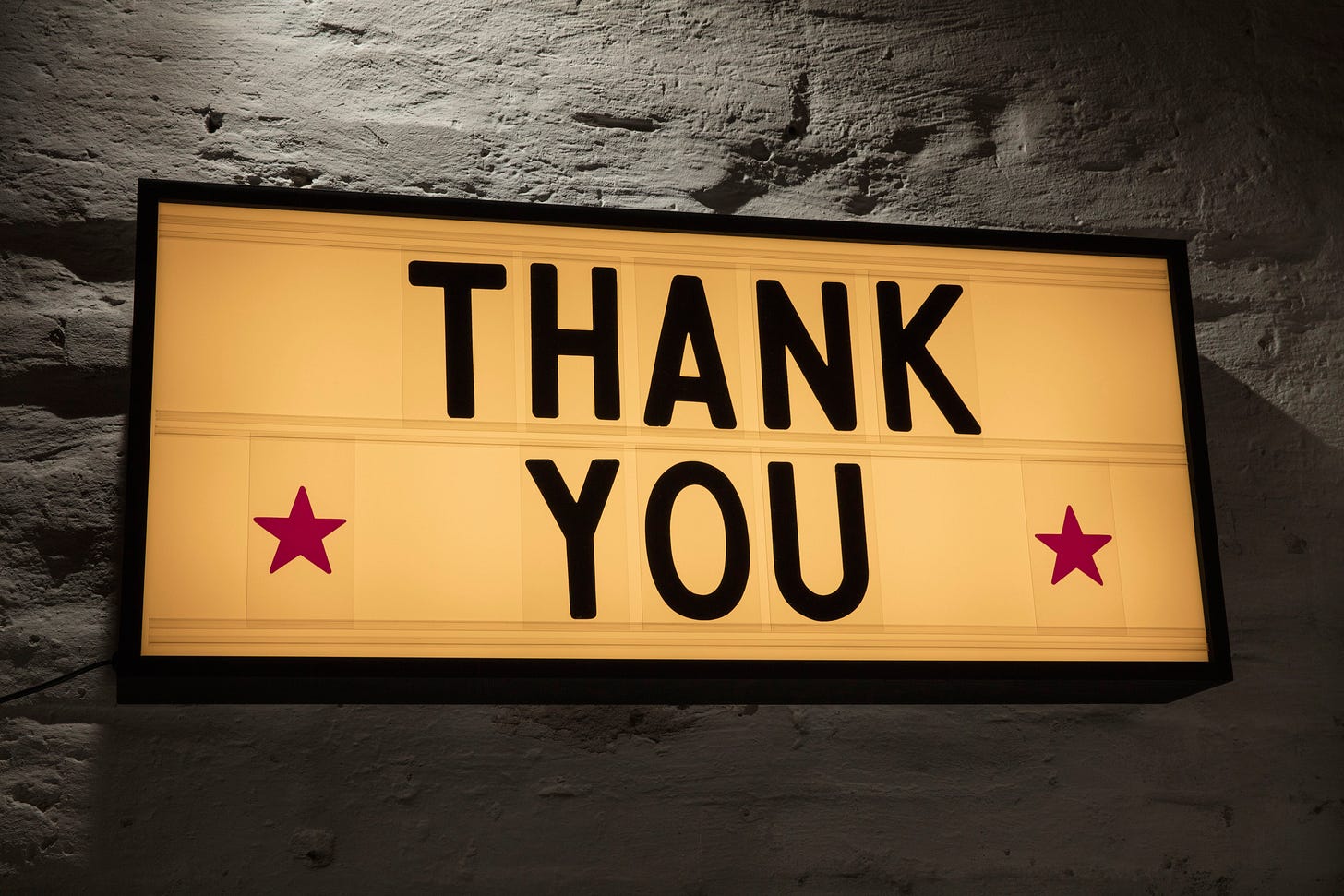
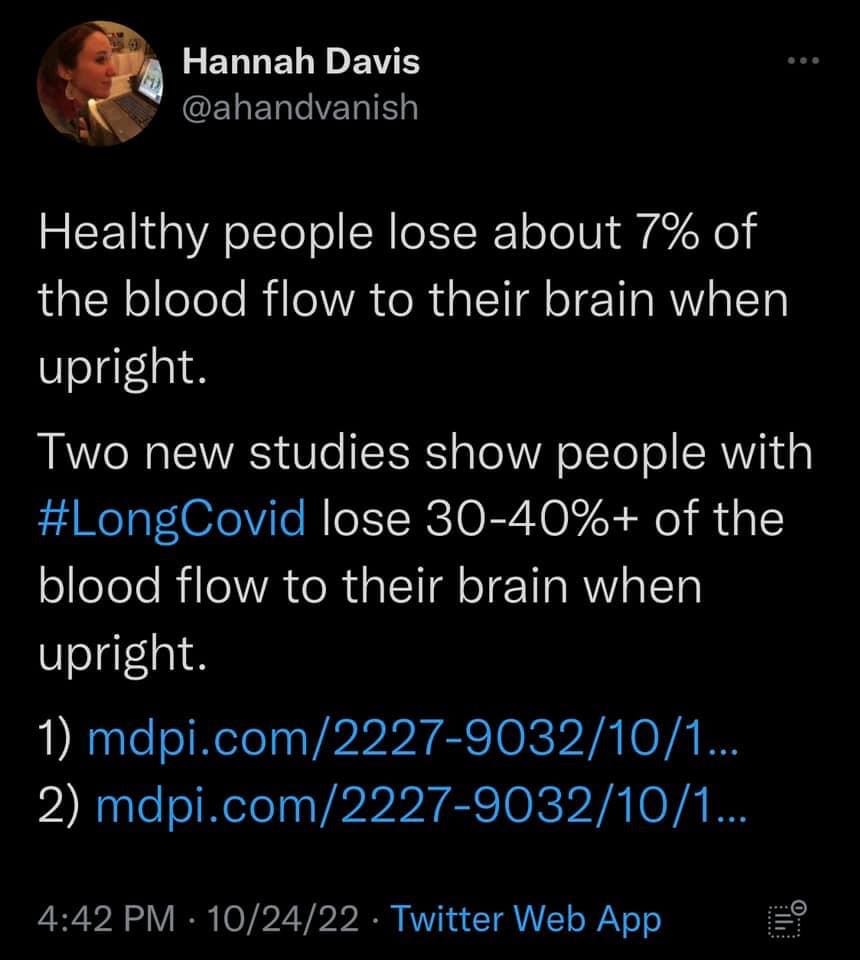

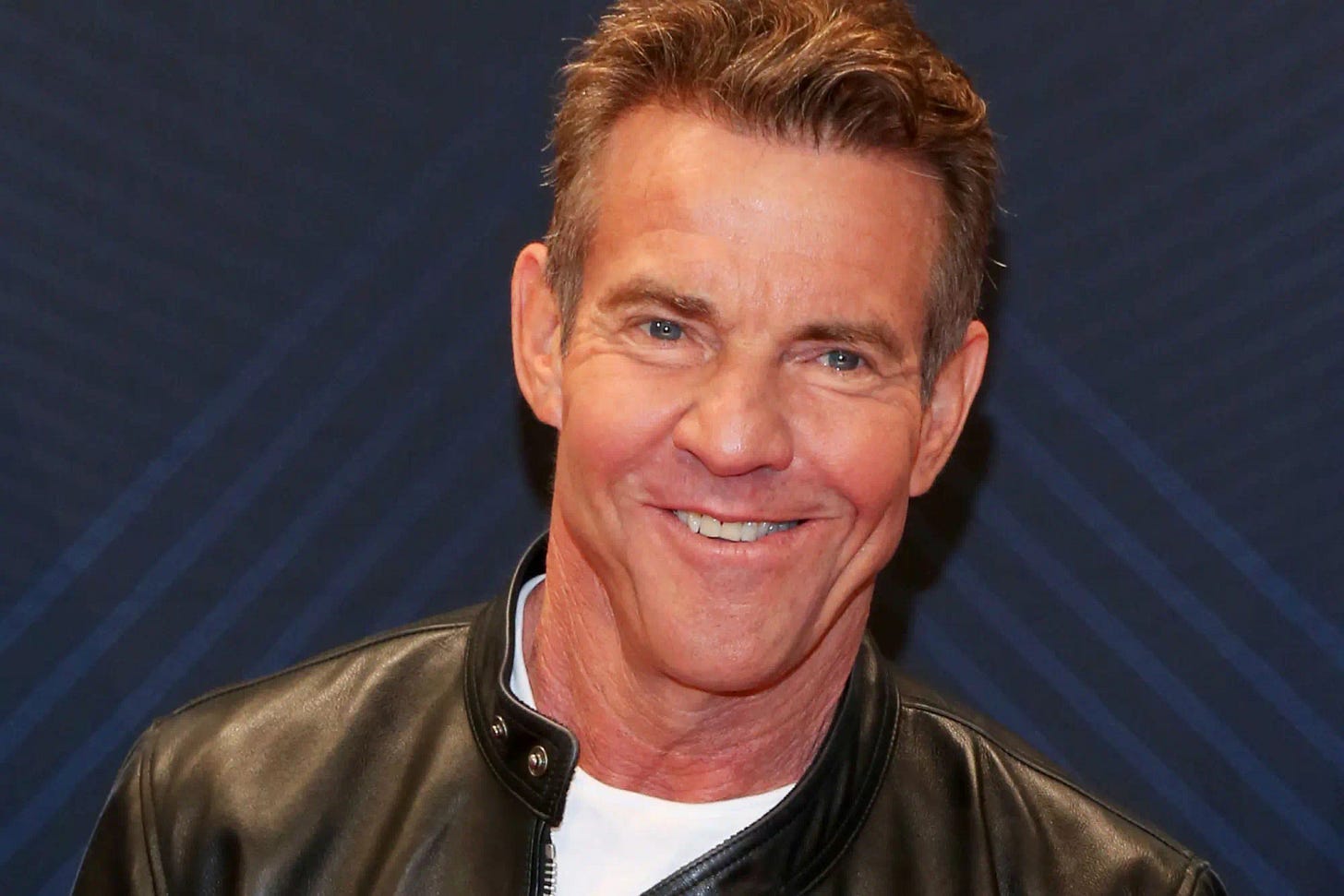
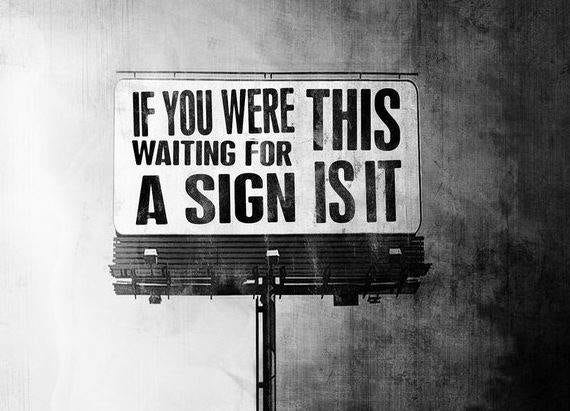


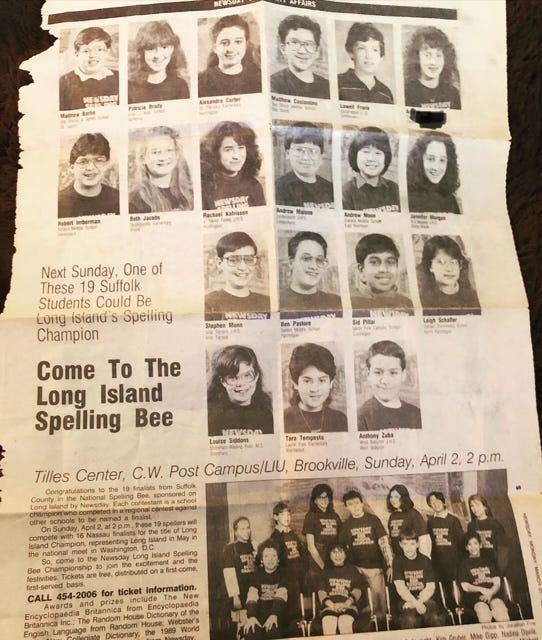


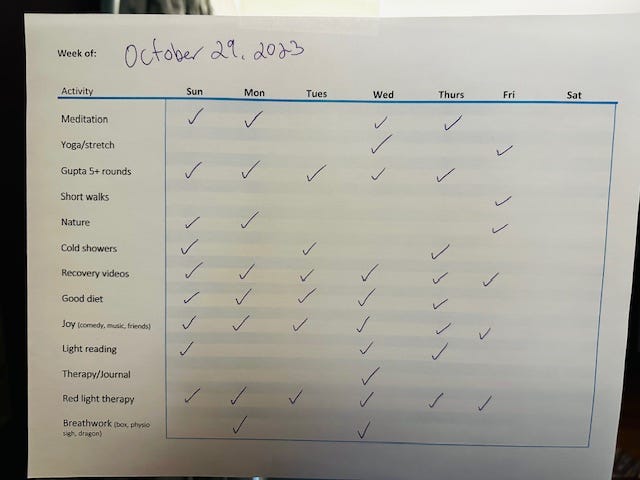
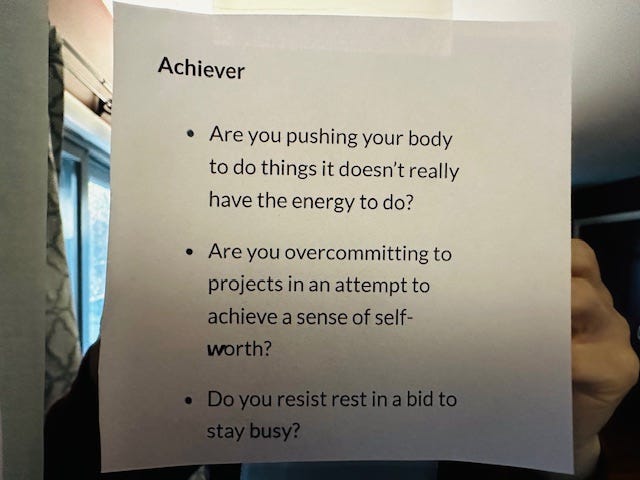







Do you have a source for the assertion that there are personality types that are more prone to developing ME/CFS? Other than Gupta, I mean.
Again Amy, a wonderful Tonic about so many things im familiar with.
After reading this, i felt a bit sad about myself and my thoughts about taking care of me.
I was quite sure that i learned in the last years about my level of energy and about the point when doing to much.
BUT after study your weekly plan of self care i totally failed about so many good things helping me to recover or paying attention to me and my body.
Thanks again for giving so much interesting hints about your daily problems. It´s a pleasure to read the Tonic´s, even when im a year behind but i catch up. :)))
Excuse my bad English :D
P.S. if you ever read that comment, is it worth to try the Gupta programm?